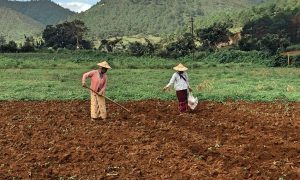In 2018, I travelled to Myanmar as part of coursework with the Australian National University to research ongoing ethnic conflict in the country. As with most of Southeast Asia, China’s regional influence permeated Yangon: billboards written in Mandarin and infrastructure projects flying the five-starred red flag lined the highway into Yangon. China’s involvement in the emerging democracy also extends to Myanmar politics—some argue China holds the key to securing peace in this Southeast Asian country.
China claims it is committed to resolving Myanmar’s 70-year civil war with various ethnic armed organisations (EAOs), pledging US$1 million to the peace-process in 2017. Yet China continues to fund many of the EAOs. Most visibly, China supports the strongest and largest EAO, the United Wa State Army (UWSA), which has been fighting for self-determination for over 30 years. China is a stakeholder in peace negotiations and contributes to the longevity of the civil war. But it is unlikely that China will take decisive action end the civil conflict in Myanmar. It is unclear that it even can.
Myanmar’s conflict with EAOs is a result of decades of divide-and-conquer tactics by the English colonisers, supplemented by a military dictatorship that further engrained ethnic tensions. Modern Myanmar has been left with widespread, multi-fronted ethnic conflict. The UWSA now controls an autonomous region in northern Shan state and estimated manpower equivalent to a third of the national army. The Wa militia also has substantial ties with smaller armed organisations, including the Northern Alliance of four separate EAOs, which the UWSA sustains financially.
Beijing provides considerable economic support to the UWSA (and indirectly the Northern Alliance) consisting of direct arms dealing, resource trading and even money transfers. Since 2013, China has provided the UWSA with helicopters, an anti-aircraft weapon and tank-destroyers. China is effectively sustaining the arsenal of the UWSA, thereby allowing it to maintain enough power to continue its demands for autonomy. Without the military capacity China provides, the UWSA would significantly weaken. This is also true of the subsidiary armies that the UWSA supports, many of which rely on the UWSA’s power and credibility to make demands of the government in Nay Pyi Taw.
China has profited from the abundance of resources and agricultural land in Wa, especially rubber, lemon and oolong tea exports. In turn, Wa imports tonnes of counterfeit consumer goods. China’s financial relationship with the Wa have led some to call Wa state “shanzhai China”. “Shanzhai” is a Mandarin word meaning mountain stronghold, but is now commonly also used to refer to counterfeit consumer goods.
On top of the economic relationship, the Chinese and Wa also have ethnic ties. There are Wa people inhabiting China’s Yunnan province, and many Wa people in Myanmar speak Mandarin, use Chinese currency and identify as being of Chinese origin. Mao Khine, an ethnic Wa man who grew up in Shan State, told me that he considers himself Chinese even though he was born in Myanmar. Although these cultural ties may not tangibly benefit the UWSA, they legitimise the UWSA’s claim to deserving an autonomous region.
State leaders and academics alike have levelled much criticism at China’s support for the UWSA. The assumption is that Beijing is sustaining the conflict, and that the civil war may end without Chinese involvement. This criticism is certainly not unfounded. China has significant power over the EAOs, with the ability to leverage their heavy reliance on Chinese weaponry and political support into signing ceasefire agreements and even into altogether disbanding. China has previously manipulated its influence over the UWSA and associated EAOs to dictate its preferred terms.
Theoretically, China could use this coercive power to force the UWSA to sign the National Ceasefire Agreement (NCA). In recent years, China has been more approving of the NCA, encouraging the UWSA to sign it and participate in ceasefire negotiations. However, the encouragement has been only a suggestion; China has not been overtly forceful in its advocation for the NCA. By threatening to withdraw funding and support if the UWSA continues to resist signing, China could ensure that the UWSA agrees to the terms of the NCA.
In reality, China is unlikely to do this. Instead, it will probably continue supporting the EAOs with cultural ties to China. Even with pressure to withdraw support, China has historically acted on its best interests. China’s Belt and Road Initiative runs through Myanmar and culminates in a US$1.3 billion port, a planned special economic zone, a rail line, and a pipeline network. Due to these infrastructure projects, China has a clear interest in Myanmar’s stability. Yet while complete anarchy is not in China’s favour, nor is peace. China’s strategic position is improved if some conflict remains. With a weak Nay Pyi Taw, Beijing occupies a stronger position of authority in negotiations with the Myanmar government.
Even if China stopped funding the UWSA, it remains improbable that lasting peace in Myanmar would materialise. Civil war in Myanmar extends beyond the UWSA and its subsidiary EAOs. The civil war is multi-fronted, and its causes and legacies pervade the country’s politics and history. Peace ultimately depends on more than just China’s involvement: the country’s civil conflict is based on systemic inequalities and grievances which remain in Myanmar even without Chinese influence. The Myanmar government must address domestic cries for self-determination and political recognition that are at the heart of the ethnic groups’ grievances.As Khun O, the director of the National Ethnic Youth Alliance, said to me: “We need China [for peace], but peace must also come from within.”
 Facebook
Facebook  Twitter
Twitter  Soundcloud
Soundcloud  Youtube
Youtube  Rss
Rss 


